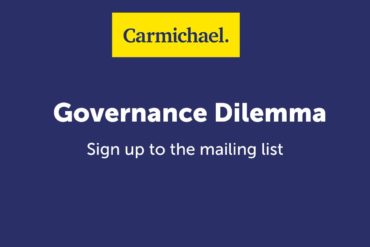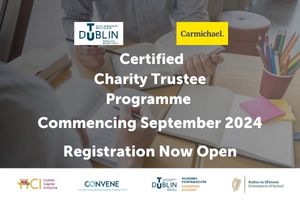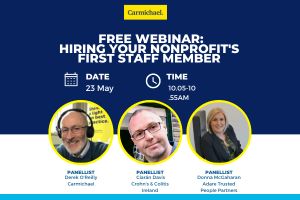Target Audience
New Board Members, Directors, Charity Trustees of non-profit organisations.
Outline
A comprehensive induction is an important first step in ensuring that new Board Members, Directors and Charity Trustees have the understanding needed to carry out their roles, responsibilities and obligations effectively. This workshop aims to form part of that induction process.
Below is an outline of the topics covered:
- Governance Overview
- Board Members’ Roles and Responsibilities
- The Chairperson
- Board Relationship with CEO/Staff
- Company Limited by Guarantee – Directors
- Charity – Charity Trustees
- What more to expect from a Board Induction
Methodology
Delivered virtually via Zoom.
Target Audience
Anyone wishing to pick up some productivity tips in the use of MS Word, Excel, PowerPoint, Outlook. Prior knowledge of Microsoft Office/Microsoft 365 is essential.
Outline
In this course you will learn productivity tips from the following Microsoft programs:
Outlook
- Cleaning up your inbox
- Scheduling emails in advance
- Creating simple rules
- Using quick parts
Word
- Working with styles
- Contents pages
- Cover pages
- Watermarks
Excel
- Cleaning data
- Separating text from within a cell
- Locking cells
- Displaying data visually
PowerPoint
- Using slides from another presentation
- Changing fonts throughout the entire presentation
- Working with images and shapes
- Using the presenter view
Methodology
Delivered via Microsoft Teams. This session will be recorded and the recording will be circulated to participants on completion.
Target Audience
New Board Members, Directors, Charity Trustees of non-profit organisations.
Outline
A comprehensive induction is an important first step in ensuring that new Board Members, Directors and Charity Trustees have the understanding needed to carry out their roles, responsibilities and obligations effectively. This workshop aims to form part of that induction process.
Below is an outline of the topics covered:
- Governance Overview
- Board Members’ Roles and Responsibilities
- The Chairperson
- Board Relationship with CEO/Staff
- Company Limited by Guarantee – Directors
- Charity – Charity Trustees
- What more to expect from a Board Induction
Methodology
Delivered virtually via Zoom.
Target Audience
This 2 hours’ session is aimed at people who have no experience of using Canva, or graphic design. Basic IT skills are required for this introductory course.
What is Canva?
Canva is a free-to-use online graphic design tool. Use it to create social media posts, presentations, posters, videos, logos and more.
Course Outline
- Opening and creating a Canva account
- Canva for Non-Profits
- Creating a design; using templates or creating from scratch
- Searching and editing elements
- Using template photos from Canva or uploading
- Adding text and using different fonts
- Saving and downloading designs
- Sharing and collaborating designs
- Design for Print
- Managing your Brand
Methodology
Delivered virtually via Zoom.
Target Audience
CEOs, senior managers or staff from non-profits/charities who’d like to learn how to improve their Microsoft PowerPoint presentations. Prior experience of using Microsoft PPT is essential.
Outline
- Slide Theory – what to think about before opening PowerPoint
- PowerPoint Fundamentals – time-saving tools to help you create professional slides
- Present with Confidence – tools to help you feel in control when you deliver your presentation
Methodology
Delivered via Microsoft Teams.
Target Audience
Board Members, Chairpersons and CEOs of non-profit organisations.
Outline
• Roles and responsibilities – Board, CEO, Chair
• Governance vs. Management
• Division of responsibilities
• Communication between CEO and Chair (Board)
• HR sub-committee (CEO Selection, Review, Remuneration, Succession Planning)
• CEO role in relation to the Board
• CEO performance appraisals – how to conduct appropriately
• Board only sessions
• Code of conduct
• Board evaluation (its value and purpose)
• Board Dilemmas
Methodology
Delivered virtually via Zoom.
Target Audience
Participants should have either completed the Intermediate course and/or be familiar with the following material from experience:
- Be comfortable with the basic functions of Excel: basic formulas and functions, creating a chart, sorting and filtering, printing and working across worksheets.
- How to create a vlookup()
- How to create a pivot table
- How to create an If() function
- How to do basic conditional formatting
This knowledge will be assumed and will not be covered in this course.
Outline
The course will take place on Zoom over 4 sessions as per details below. Homework will be assigned between sessions. Resources and links will be stored on a platform called GiraffePad. Please note these sessions will be recorded and recordings will be sent to attendees only. Full instructions and links will be given after registration.
Session One (90 minutes) Wed 09 Apr starting at 3.15pm
Pivot Tables beyond the basics – learn how to use pivot tables even more effectively:
- Learn how to combine datasets without the use of a vlookup or index/match.
- Learn how to use the GetPivotData() function to extract information from a pivot table to use elsewhere.
- Introduction to PowerPivot to create more complex calculations that currently feasible in standard pivot tables.
Session Two (90 minutes) Wed 16 Apr starting at 3.15pm
Automate your work:
- Introduction to Macros.
- Learn to create more complex formulas e.g. nested ifs, index/match
Session Three (90 minutes) Wed 23 Apr starting at 3.15pm
Automate data cleaning with Power Query:
- For regular data cleansing tasks – set them up in Power Query – do them once and that’s it. Speed up those tedious data cleansing tasks.
Session Four (90 minutes) Wed 30 Apr starting at 3.15pm
Visualising your data with Dashboards:
- Present your data in a more user friendly way by summarizing it in an interactive dashboard.
Methodology
- Delivered virtually via Zoom.
- GiraffePad will be the platform used to hold the Zoom links/training materials/recordings.
- Homework will be assigned between sessions.
Target Audience
Managers and Board Members of charities and not-for-profits.
Outline
This interactive workshop will provide the participant with a view of the cyber security risks faced by charities and not-for-profits and measures they can take to reduce these risks.
- Introduction:
- What is cyber security and why is it important?
- The different types of cyber threats.
- The impact of a cyber attack on a charity or not-for-profit.
- The importance of cyber security awareness for management.
- Case studies
- Cyber security best practices:
- Social engineering
- Password security
- Email security
- Physical security
- Incident response
Methodology
Delivered virtually via Google Meet. There are a number of short videos showing examples of various techniques being used to compromise people. A copy of the slides will be provided as well as a link to download cyber security related guidance.
Target Audience
Staff members of charities and not-for-profits.
Outline
This interactive workshop will provide the participant with a detailed view of the cyber security measures they can take to help protect themselves and their organisation from being compromised by a cyber security incident.
- Introduction:
- What is cyber security and why is it important?
- Understanding Social Engineering.
- Recognising and handling fraudulent messages
- Protecting online accounts
- Cyber security best practices
Methodology
Delivered virtually via Google Meet. There are a number of short videos showing examples of various techniques being used to compromise people. A copy of the slides will be provided as well as a link to download cyber security related guidance.
Target Audience
The Treasurer has an important role in an organisation. An effective treasurer contributes to a successful organisation and is essential to Community, Voluntary or Charitable Organisations fulfilling their responsibility to manage their money and other resources properly. This workshop is for anyone who is a Treasurer or may be thinking of taking up office as a Treasurer and anyone looking to appoint or recruit a treasurer.
Outline
The main areas covered will be:
- Main responsibilities and duties of a treasurer
- Characteristics of a good treasurer
- Useful skills for a treasurer
- Tips for being an effective treasurer
- Pit falls to avoid
- Basic rules of dealing with money
- How the Treasurer fits into the management committee or Board
- Accountability
The workshop will include discussions and practical examples of how to carry out the duties of a treasurer and good practice
Methodology
Delivered virtually via Zoom.




